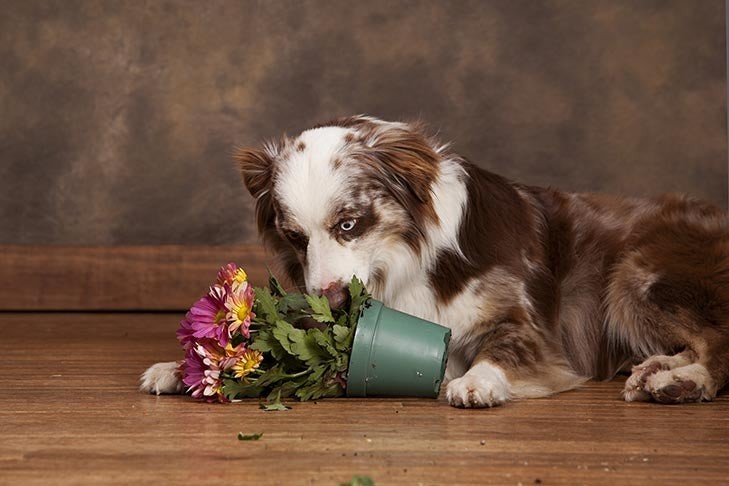As a devoted dog owner, you’re likely accustomed to witnessing your furry friend explore the world with their mouths, sometimes leading them to ingest peculiar items. However, if you’ve noticed your dog consistently eating dirt, or attempting to, you might be understandably concerned. This behavior, while seemingly odd, is not uncommon and can stem from various underlying issues.
Understanding Canine Pica and Dirt Eating
According to holistic veterinarian Dr. Laurie S. Coger, DVM, dirt eating in dogs falls under a condition known as “pica.” Pica is characterized by the consumption of non-food substances. The reasons behind this behavior can be multifaceted, ranging from nutritional deficiencies to behavioral factors and even underlying health problems. Stress and boredom can also contribute to pica, leading dogs to ingest a variety of unusual items, including dirt.
It’s crucial not to dismiss persistent dirt-eating in your dog, as it could signal a more significant health concern. Some potential reasons your dog might be eating dirt include:
- Anemia (Low Red Blood Cell Count): A deficiency in red blood cells can sometimes lead to pica as the body attempts to compensate for the lack of essential nutrients.
- Nutritional Imbalances or Deficiencies: Inadequate levels of vitamins and, particularly, minerals in your dog’s diet can trigger cravings for dirt as they instinctively seek out missing nutrients.
- Low-Quality Food: Diets lacking in essential nutrients and fillers can contribute to nutritional deficiencies and subsequent pica.
- Upset Stomach or Gastrointestinal Issues: While dogs with stomach upset are more commonly observed eating grass, gastrointestinal discomfort can sometimes manifest as dirt eating.
Dr. Coger points out that if your dog’s dirt-eating behavior is frequent, intense, or involves consuming large amounts of dirt, it’s essential to consult with your veterinarian. Changes in your dog’s stool can also be an indicator that a veterinary check-up is necessary. Bloodwork can be instrumental in identifying any underlying health abnormalities that might be causing the behavior.
The Potential Dangers of Dirt Consumption
Allowing your dog to eat dirt regularly carries several risks. The primary concern is intestinal impaction, a condition where hardened stool becomes lodged in the intestines due to chronic constipation. This is especially a risk if your dog ingests a large quantity of dirt at once and can sometimes necessitate surgery to resolve.
Dr. Coger further cautions that dirt can harbor pesticides, fertilizers, and other toxins that can reach harmful levels upon ingestion. Depending on the composition of the dirt, dental damage or wear can also occur. If the dirt contains rocks, it can cause damage to your dog’s teeth or create obstructions within the digestive tract, from the throat down. Sharp objects like sticks present in the dirt can puncture the delicate linings of the mouth, throat, stomach, or intestines. Furthermore, dirt can be a source of parasites, leading to a range of additional health problems for your dog.
Dr. Coger emphasizes the importance of addressing any new and unnatural behaviors like dirt eating promptly. Acting quickly is crucial not only to identify potential serious underlying causes but also to prevent the behavior from becoming an ingrained habit. Dogs can learn from each other, and as Dr. Coger humorously notes, “who wants a houseful of dirt eaters?”
Strategies to Prevent Dirt Eating in Dogs
If you suspect that nutritional imbalances are driving your dog’s dirt-eating habit, a consultation with your veterinarian is essential. They can assess your dog’s current diet and recommend necessary adjustments. On the behavioral front, ensuring your dog receives adequate physical and mental stimulation is crucial. Boredom is a significant contributor to pica, and sufficient exercise and engaging activities can help redirect this behavior.
If these measures are insufficient, Dr. Coger suggests that “denying access to favorite dirt-eating areas may be required.” Ultimately, remember that dirt eating can be a symptom of a larger issue, and it should never be ignored. Proactive intervention and veterinary guidance are key to ensuring your dog’s health and well-being.


